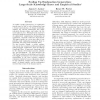AAAI
1996
14 years 29 days ago
1996
Rule induction research implicitly assumes that after producing the rules from a dataset, these rules will be used directly by an expert system or a human user. In real-life appli...
AAAI
1994
14 years 29 days ago
1994
In this paper, we study the problem of achieving efficient interaction in a distributed scheduling system whose scheduling agents may borrow resources from one another. Specifical...
AAAI
1994
14 years 29 days ago
1994
Most Artificial Intelligence programs lack generality because they reason with a single domain theory that is tailored for a specific task and embodies a host of implicit assumpti...
AAAI
1996
14 years 29 days ago
1996
AAAI
1994
14 years 29 days ago
1994
ing with credit is permitted. To copy otherwise, to republish, to post on servers or to redistribute to lists, requires prior specific permission and/or a fee. The following notice...
AAAI
1996
14 years 29 days ago
1996
The Airport Example The Omelette Example Copyright c 1996 American Association for Artificial Intelligence. All rights reserved. Despite the existence of programs that are able to ...
AAAI
1994
14 years 29 days ago
1994
Neural networks were evolved through genetic algorithms to focus minimax search in the game of Othello. At each level of the search tree, the focus networks decide which moves are...
AAAI
1996
14 years 29 days ago
1996
To explain complex phenomena, an explanation system must be able to select information from a formal representation of domain knowledge, organize the selected information into mul...
AAAI
1994
14 years 29 days ago
1994
We describe a method for learning formulas in firstorder logic using a brute-force, smallest-first search. The method is exceedingly simple. It generates all irreducible well-form...
AAAI
1996
14 years 29 days ago
1996
We describe Occam, a query planning algorithm that determines the best way to integrate data from dierent sources. As input, Occam takes a library of site descriptions and a user ...

